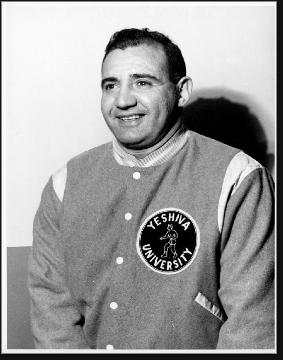
Sport: Wrestling
Born: September 18, 1918
Died: March 9, 2010
Town: Jersey City, New Jersey
Henry Wittenberg was born September 18, 1918 in Jersey City, NJ. A bright student with a sleek, muscular body, he was drawn to the chess club and swimming pool as a teenager. He competed for the swim team at Dickinson High School, but was not proficient at executing turns. After graduating, Henry attended City College in New York, and didn’t give a second thought to sports.
However, the CCNY wrestling coach, Joe Sapora, spotted Henry on campus and convinced him to give wrestling a try. Henry trained like a demon, running the steps at Lewisohn Stadium, the campus amphitheater, and engaging in weight training—which was unusual for wrestlers of that era. By his junior year, he was winning meets and, as a senior, he was regarded as one of the nation’s top grapplers.
In 1940, as a Columbia grad student, Henry won his first AAU title as a light heavyweight. That year he began an unbeaten streak that ran into the many hundreds. Though armed with a masters degree in education, Henry was unable to find an appealing teaching position, so he moved into a Bronx apartment and joined the NYPD. He enlisted in the navy during World War II, and returned to police work after he was discharged. Henry also continued his unbeaten streak at the AAU championships, winning each of the seven tournaments he entered during the 1940s and 1950s.
Henry qualified for the 1948 Olympic team and competed as a light heavyweight in the freestyle competition. He injured tendons in his chest during his semifinal match victory, but continued on and won the gold medal in the finals against Karl Stockli of Switzerland (who was also an Olympic bobsledder).
In 1950, Henry helped to reestablish the Maccabiah Games in Israel, and won the wrestling completion that year and again in 1953. Henry’s final Olympic appearance came in 1952. He lost to champion Viking Palm of Sweden, settling for silver.
Henry left the police force in 1954 to start up a wrestling team for Yeshiva University. The annual tournament at Yeshiva was later named in his honor. In the early 1960s, Henry wrote a best-seller called Isometric Exercises. Three years later, he took a job at CCNY as a phys-ed professor and also coached the wrestling team.
In 1968, Henry coached the U.S. Olympic Greco-Roman team. In 1977, he was inducted into the Wrestling Hall of Fame and, in 1979, he retired as a coach. Henry passed away at age 91 at his home in Somers, New York.